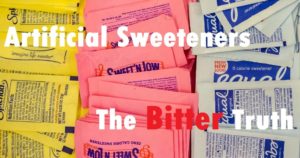
There are still plenty of people who think they’re doing themselves a favour by using artificial sweeteners, but plenty of research appears to indicate that this is far from the case. Anything which professes 1 to be a healthy alternative to table sugar and high fructose corn syrup but which, in reality, actually increases the progression of serious chronic illness 2 would be a bitter pill to swallow for those with a sweet tooth.
Whichever artificial sweetener you’re using – saccharin (Sweet & Low), sucralose (Splenda), or aspartame (NutraSweet) – it appears that the manufacturers’ claims, that they are harmless sugar substitutes providing the sweet taste without the calories or spikes in blood sugar, are unfounded. And not only that, these products seem to produce even worse health problems than normal table sugar.
Blog Contents
Correlation or causation?
Artificial sweeteners are mainly consumed in fizzy drinks (known as diet sodas in the US) such as Diet Coke, etc. There are increasing concerns about the association between an increase in a population’s consumption of such drinks and a corresponding increase in rates of:
Testing in the lab
When the immediate physiological responses to the intake of the likes of sucralose are tested in the lab, the results 8 9 show a significant blood sugar spike in response to a glucose tolerance test.
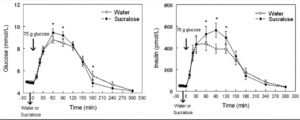
This means that more insulin is produced (around 20% more) and this, in turn, can lead to insulin resistance. This would explain why consumption of artificial sweeteners is linked to increased rates of the above chronic diseases.
What mechanism is involved?
Normal table sugar (sucrose) and other natural sugars are converted into glucose and absorbed into the bloodstream while passing through the stomach and small intestine. The producers of sucralose etc claim 1 that they are supposed to be relatively inert substances that passes through the intestinal tract and out of the body without being absorbed.
Well, this might be the case in terms of absorption in the stomach and small intestine, but when these chemicals end up in the large intestine (colon), that’s when the trouble begins.
Research has shown 10 11 that, upon arriving in the colon, sucralose, saccharin and aspartame (as well as another artificial sweeteners called acesulfame K 12 ) all exert a negative effect on our microbiota, also called gut flora – the billions of microbes living in our guts. In previous blogs 13 14 15 16 17 18 , we’ve seen the wide-reaching influence of our gut bacteria on pretty much all aspects of our health. Additional studies on both rats 19 and humans 20 have found that the changes to the microbiota caused by consumption of artificial sweeteners induces glucose intolerance.
So, it came as quite a shock to some 21 that substances introduced to help solve the problems associated with obesity are actually having quite the opposite effect by producing unhealthy microbial alternations.
Researchers found 22 , for instance, that each molecule of aspartame is metabolised into formaldehyde, not a substance you want inside your body 23 24 25 .
Industry bias? surely not…
Regarding aspartame, all studies funded by the artificial sweetener industry show that it’s perfectly safe .
However, 92% of independently funded studies 26 found that aspartame produces adverse health effects.
As Dr Greger says in an article covering this subject 27 : “That should tell you something.”
IBD & artificial sweeteners
We know how particularly important a healthy microbiota is for those with:
- IBS (irritable bowel syndrome)
- IBDs (inflammatory bowel diseases)
- UC (ulcerative colitis)
- CD (Crohn’s disease)
However, it may not be made clear to these individuals that research shows 21 artificial sweeteners can exacerbate their already unpleasant symptoms by negatively affecting their gut bacteria.
Increase in IBDs in whole populations
Canada was the first country to approve the use of sucralose. IBD rates doubled after sucralose was approved 28 .
In the United States, after decades of relatively stable rates of ulcerative colitis and Crohn’s disease, rates started rising after artificial sweeteners were introduced 29 30 .
In China, IBD rates rose by 1200% after sucralose was introduced 31 .
Similar related increases have been found in Norway, Europe and Australia 31 32 .
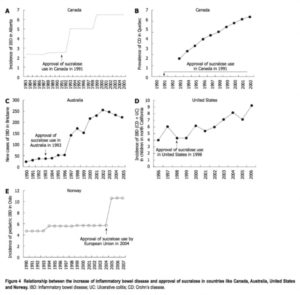
It would be hard to discount completely a causal connection existing here…
Is stevia okay?
There needs to be a lot more research on stevia, a sugar substitute extracted from the leaves of the plant species Stevia rebaudiana. Dr Greger considers 33 that its unwelcome ability to cause a big spike in mutagenic DNA damage 34 in rats should not be of great concern if you have only two beverages per day sweetened with stevia. Above this quantity, there’s evidence that it may cause DNA damage in humans.
However, neither Dr Greger nor any other source I can find at the moment gives any clear data on stevia’s effect on insulin spikes. Some research 35 36 37 38 is available if you want to study it further. For my part, I would leave well alone, since there is simply too much uncertainty about its effects on humans over prolonged periods of time. In any event, it is still a sweetener that will help to keep us hooked on that sweet taste – something we should ideally learn to live without for the most part.
What if you stop using artificial sweeteners?
Research 39 shows that once you stop using artificial sweeteners, the balance of your normal gut bacteria should be restored within just a matter of weeks.
Final thoughts
So what’s the solution?
It’s not just a matter of avoiding all artificial sweeteners, but of avoiding all added sugars, if possible. Giving up sucralose to take up sucrose or high fructose corn syrup is not advised 40 if you want to maintain optimal health (as can be seen from the following chart, where SSB = sugar-sweetened beverage and ASB = artificially-sweetened beverage).
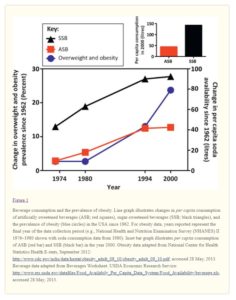
I know personally that it’s tough to make a change away from sweet foods and drinks once you’ve become used (addicted?) to them. I’ve always had a sweet tooth and getting through a single meal without a sugar hit was almost impossible for me during the majority of my life. However, I’ve found that it’s possible to ditch all added sugars and reeducate the taste buds.
Yes, it may take some effort at first, but it’s worth it in the long run and your body will thank you for it 26 .
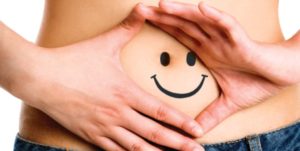
References
- V L Grotz. Sucralose and migraine. Headache. 2008 Jan;48(1):164-5. [↩] [↩]
- M Y Pepino. Metabolic effects of non-nutritive sweeteners. Physiol Behav. 2015 Dec 1;152(Pt B):450-5. [↩]
- Harvard Medical School: Is there a link between diet soda and heart disease? [↩]
- Harvard Medical School: Does drinking diet soda raise the risk of a stroke? [↩]
- Yale J Biol Med. 2010 Jun; 83(2): 101–108. Gain weight by “going diet?” Artificial sweeteners and the neurobiology of sugar cravings. Neuroscience 2010. Qing Yang. [↩]
- Medscape: The Link Between Daily Consumption of Diet Soda and Development of metabolic Syndrome and Type 2 Diabetes. [↩]
- Medical News Today: What to know about diet soda and diabetes [↩]
- M Y Pepino, C D Tiemann, B W Patterson, B M Wice, S Klein. Sucralose affects glycemic and hormonal responses to an oral glucose load. Diabetes Care. 2013 Sep;36(9):2530-5. [↩]
- M Y Pepino, S Klein. Response to comment on Pepino et al. Sucralose affects glycemic and hormonal responses to an oral glucose load. Diabetes care 2013;36:2530-2535. Diabetes Care. 2014 Jun;37(6):e149. [↩]
- C Greenhill. Gut microbiota: not so sweet–artificial sweeteners can cause glucose intolerance by affecting the gut microbiota. Nat Rev Endocrinol. 2014 Nov;10(11):637. [↩]
- N A Bokulich, M J Blaser. A bitter aftertaste: unintended effects of artificial sweeteners on the gut microbiome. Cell Metab. 2014 Nov 4;20(5):701-3. [↩]
- C L Frankenfeld, M Sikaroodi, E Lamb, S Shoemaker, P M Gillevet. High-intensity sweetener consumption and gut microbiome content and predicted gene function in a cross-sectional study of adults in the United States. Ann Epidemiol. 2015 Oct;25(10):736-42. [↩]
- Obstructive Sleep Apnea (OSA) & Gut Microbiota [↩]
- Gut Microbiota & Depression [↩]
- Fibromyalgia, Probiotics & Gut Microbiota [↩]
- Multiple Sclerosis (MS), Serotonin & Gut Microbiota [↩]
- Two Types of Gut Bacteria: Plant Eaters’ & Meat Eaters’ [↩]
- IBD / Crohn’s Disease / Ulcerative Colitis & WFPB Diet Part 5 of 5 [↩]
- M B Abou-Donia, E M El-Masry, A A Abdel-Rahman, R E McLendon, S S Schiffman. Splenda alters gut microflora and increases intestinal p-glycoprotein and cytochrome p-450 in male rats. J Toxicol Environ Health A. 2008;71(21):1415-29. [↩]
- J Suez, T Korem, D Zeevi, G Zilberman-Schapira, C A Thaiss, O Maza, D Israeli, N Zmora, S Gilad, A Weinberger, Y Kuperman, A Harmelin, I Kolodkin-Gal, H Shapiro, Z Halpern, E Segal, E Elinav. Artificial sweeteners induce glucose intolerance by altering the gut microbiota. Nature. 2014 Oct 9;514(7521):181-6. [↩]
- U Gophna. Microbiology. The guts of dietary habits. Science. 2011 Oct 7;334(6052):45-6. [↩] [↩]
- E Pretorius. GUT bacteria and aspartame: why are we surprised? Eur J Clin Nutr. 2012 Aug;66(8):972. [↩]
- MRC: Toxic formaldehyde is produced inside our own cells, scientists discover [↩]
- LiveScience: The Truth About Aspartame [↩]
- N K Veien, H B Lomholt. Systemic allergic dermatitis presumably caused by formaldehyde derived from aspartame. Contact Dermatitis. 2012 Nov;67(5):315-6. [↩]
- P Shankar, S Ahuja, K Sriram. Non-nutritive sweeteners: review and update. Nutrition. 2013 Nov-Dec;29(11-12):1293-9. [↩] [↩]
- Splenda Side-Effects. Written By Michael Greger M.D. FACLM on October 9th, 2018 [↩]
- X Qin. What made Canada become a country with the highest incidence of inflammatory bowel disease: could sucralose be the culprit? Can J Gastroenterol. 2011 Sep;25(9):511. [↩]
- X Qin. When and how was the new round of increase in inflammatory bowel disease in the United States started? J Clin Gastroenterol. 2014 Jul;48(6):564-5. [↩]
- SB Ingle, EV Loftus, WJ Tremaine, et al. Increasing incidence and prevalence of inflammatory bowel disease in Olmsted county, Minnesota, during 2001–2004. Gastroenterology. 2007;132:A19–A20. [↩]
- X Q Wang, Y Zhang, C D Xu, L R Jiang, Y Huang, H M Du, X J Wang. Inflammatory bowel disease in Chinese children: a multicenter analysis over a decade from Shanghai. Inflamm Bowel Dis. 2013 Feb;19(2):423-8. [↩] [↩]
- X Qin. Etiology of inflammatory bowel disease: a unified hypothesis. World J Gastroenterol. 2012 Apr 21;18(15):1708-22. [↩]
- Is Stevia Good for You? Michael Greger M.D. FACLM August 30th, 2010 Volume 4 [↩]
- Mutagenesis. 1996 Nov;11(6):573-9. Evaluation of the genotoxicity of stevioside and steviol using six in vitro and one in vivo mutagenicity assays. Matsui M, Matsui K, Kawasaki Y, Oda Y, Noguchi T, Kitagawa Y, Sawada M, Hayashi M, Nohmi T, Yoshihira K, Ishidate M Jr, Sofuni T. [↩]
- J Agric Food Chem. 2012 Feb 1;60(4):886-95. doi: 10.1021/jf2044907. Epub 2012 Jan 24. The leaves of Stevia rebaudiana (Bertoni), their constituents and the analyses thereof: a review. Wölwer-Rieck U. [↩]
- J AOAC Int. 2012 Nov-Dec;95(6):1588-96. Simultaneous analysis of steviol and steviol glycosides by liquid chromatography with ultraviolet detection on a mixed-mode column: application to Stevia plant material and Stevia-containing dietary supplements. Jaworska K, Krynitsky AJ, Rader JI. [↩]
- Stevia rebaudiana Bertoni, source of a high-potency natural sweetener: A comprehensive review on the biochemical, nutritional and functional aspects. Roberto Lemus-Mondaca, Antonio Vega-Gálvez, Liliana Zura-Bravo, Kong Ah-Hen. [↩]
- Food Chem. 2012 Dec 1;135(3):1861-2; author reply 1784. doi: 10.1016/j.foodchem.2012.06.080. Epub 2012 Jun 29. “Extraction and safety of stevioside”; response to the article “Stevia rebaudiana Bertoni, source of a high potency natural sweetener: a comprehensive review on the biochemical, nutritional and functional aspects”. Puri M. [↩]
- J Suez, T Korem, G Zilberman-Schapira, E Segal, E Elinav. Non-caloric artificial sweeteners and the microbiome: findings and challenges. Gut Microbes. 2015;6(2):149-55. [↩]
- S E Swithers. Artificial sweeteners produce the counterintuitive effect of inducing metabolic derangements. Trends Endocrinol Metab. 2013 Sep;24(9):431-41. [↩]